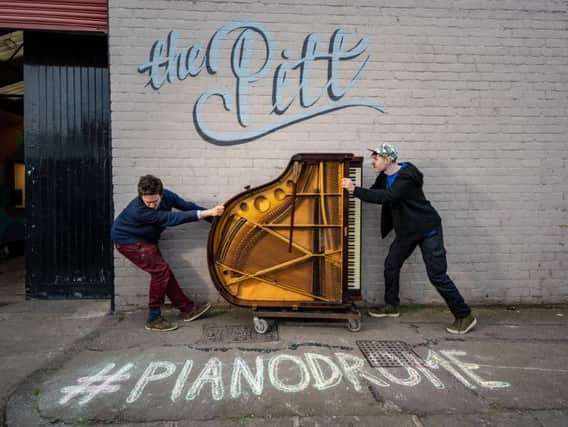Music Review: Pianodrome at the Pitt, Pitt Street Market,Edinburgh


****Musicians Tim Vincent-Smith and Matthew Wright came up with the ingenious idea of upcycling 50 uprights to create a special intimate performing space where you get to sit on several bits of piano.
Following the Pianodrome’s festival debut last year at the Botanic Garden, the 100-seat amphitheatre was taken apart and put back together again for this year’s festival in the informal hippy chic ambience of Pitt Street Market.
Advertisement
Hide AdVincent-Smith and Wright are also founders of S!nk, the house band at Pianodrome performing most nights with special guests. The tightly-knit group can turn their multi-talents to any style and never miss an opportunity for some theatrics.
In their tango-infused opener The Sound of Museli, Daniel Dumnov had to keep up with his piano which was continually wheeled around the floor. And Vincent-Smith rode a bicycle around the Piandrome’s perimeter in Velo adding a soft tick to Wright’s husky saxophone riffs and Dave Tunstall’s hypnotic bass line.
The warm resonance of percussionist Tim Lane’s Tongue Drum laid down the beat for the recreated funky Klezmer improvisation The Knife which ended with four band members each playing one of the pianos built into seating.
Based in Edinburgh, S!nk references the city in many of their pieces, such as the foot-stomping 1234 7 written in the Meadows and Dissection Bar which came together at the Summerhall venue. And Vincent-Smith picked up his ukulele for Theo, a touching song he wrote from his young son’s maxim that ‘Life’s not about truth, it’s about parties’.
Seeing the world through the eyes of a child was also the theme running through Scots singer and songmaker Kirsty Law’s show Young Night Thought. It began with a short film with the same title by Darren Warren which beautifully captured the fleeting multi-sensory dream-like imaginations of small children.
Law’s haunting soundtrack shapeshifts with the images as she sings in a folk hip-hop fashion, ‘like the cuckoo I’ll be gone.’ There’s also some fantastic archive footage of folk legends Hamish Henderson and traditional singer Janie Turriff in Rigs O’ Rye. Artist Kirsty Whiten’s striking paintings are woven into the film and the finished canvases were hung in the Pianodrome for Law’s live performance with her band and dancer Emma Snellgrove.
Advertisement
Hide AdLaw’s superb reworking of the traditional song My Rovin’ Eye had the lithesome Snellgrove twisting, turning and bending like an elegant leaf tossed in the wind, subtly enhancing the subtext of the lyrics while Esther Swift’s dramatic splashes of harp underscored the supernatural elements of Fairy Boy, based on the tale about a child dancing until dawn with the fairies.
Law has a ravishing voice which was to the fore in her sensitive arrangement of Iron Bear where she played a repeated line on the keyboard supported on bass by Ben Seal and Owen Curtis Williams on drums. Her seamless melding of the traditional with the modern through several artforms is both engaging and entrancing.
Advertisement
Hide AdThe Hebrides Ensemble also transported the audience to two vastly different but related worlds. Nigel Osborne’s piano trio, The Piano Tuner follows a London piano tuner in the 1880s on his extraordinary journey into the jungle to tune a piano. The musicians conjured up exotic birds and insects such as dragonflies with some onsite comment from the local Leith seagulls.
This contemporary work was bookended by Slavic music of the 1880s. Janá?ek’s Dumka was given an expansively romantic reading by violinist Zöe Beyers and pianist Huw Watkins who were joined by cellist Will Conway for Dvo?ák’s Dumky Trio Op 90.
These six complex episodes explored a range of emotions, but it was the dizzying Hungarian rhythms that dominated.The relaxed informal spirit of the Pianodrome, where you can come along and dance to the music or tinkle a few ivories encapsulates the true spirit of the fringe.
It’s but a short number 11 bus ride from the centre of town and there are helpful directions chalked on the pavements.
Don’t miss the last week of shows before this unique venue is dismantled. Until 24 August
For unlimited access to The Scotsman's Fringe coverage, subscribe here.
